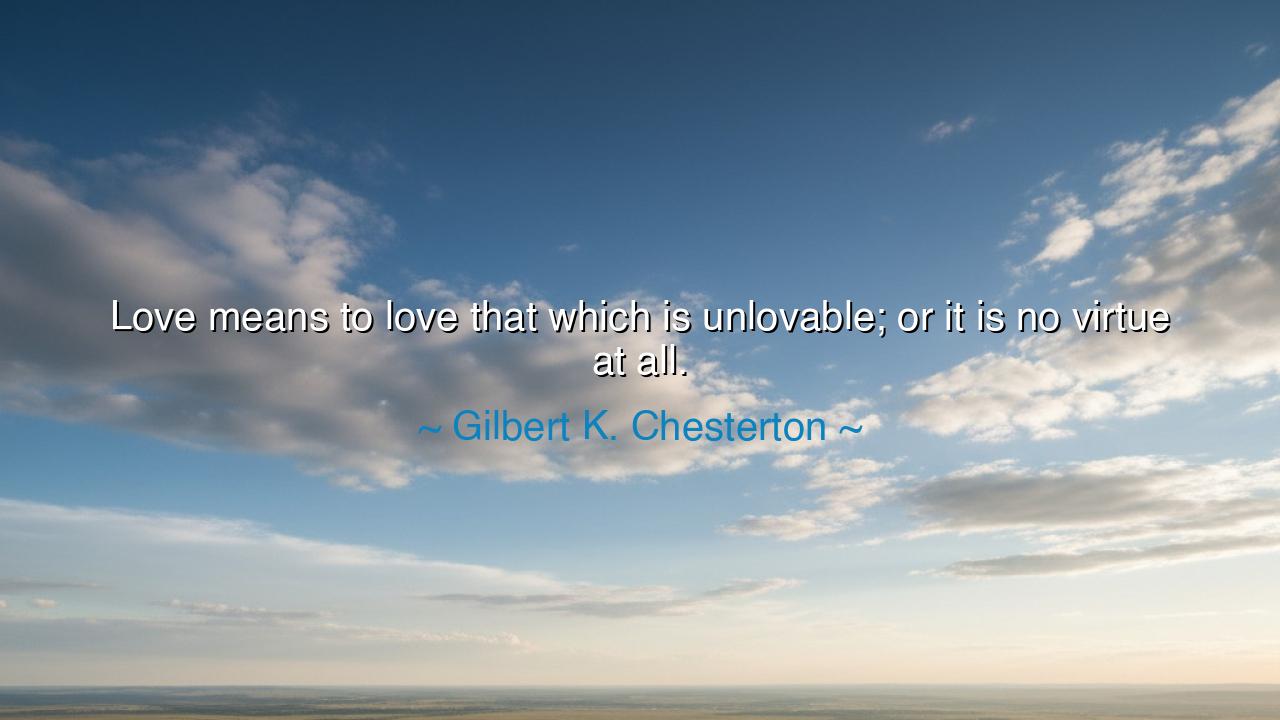
Love means to love that which is unlovable; or it is no virtue at






Gilbert K. Chesterton, a master of paradox, presents us with a profound challenge: “Love means to love that which is unlovable; or it is no virtue at all.” These words strike at the very heart of what it means to love—not as a simple, comfortable feeling, but as a powerful force that transcends our natural inclinations. True love, Chesterton argues, is not the easy love of those who are kind, beautiful, or easy to love; it is the love that reaches out to those who seem unworthy of affection, to those who may not even seem to deserve it. To love what is unlovable is the truest test of love's virtue, for it demands more than mere emotion; it demands strength, sacrifice, and a depth of compassion that goes beyond all that is easy or convenient.
The ancients knew this to be true. Plato, in his Symposium, described love as a pursuit that leads the soul from the physical to the spiritual, from the beauty of the body to the beauty of the soul. But the highest form of love, agape, transcends even beauty—it is love that reaches into the depths of the imperfect and the flawed. For the ancient philosophers, love was not a simple attraction; it was a noble force that sought to heal, uplift, and redeem. To love the unlovable was to embrace the full human condition, to see not only what was beautiful or worthy, but to seek the goodness even in that which appeared beyond hope. The love of the unlovable is the love that does not judge by appearance, but by essence, and it is this kind of love that is the highest and most virtuous.
Consider, O children, the story of Hercules and his twelve labors. Each of these labors was, in its way, a challenge that required Hercules to face what was unlovable—monsters, impossible tasks, and situations that seemed beyond redemption. Yet, Hercules did not shrink from these tasks; he faced them with courage, determination, and an open heart. His love for his people, for the gods, and for justice propelled him to do what no other could do. His love was not for the easy or the pleasant; it was a love that demanded sacrifice, that reached into the very heart of darkness and brought light. This love, like Chesterton’s ideal, was the true virtue—it was not bound by the limits of personal preference, but by a higher calling to serve and redeem.
Similarly, the love between Antigone and her brother Polynices in the ancient Greek tragedy exemplifies Chesterton’s idea. Antigone’s love was not easy; it was not for a brother who was beloved by all, but for a man who had been deemed a traitor and dishonored by the state. Yet, Antigone’s devotion to her brother led her to defy the law, to risk her life in a bold act of love and loyalty. She loved her brother not because he was worthy of love in the eyes of society, but because her heart recognized the value of love beyond society’s judgment. Her love, like Hercules’, was a virtue because it demanded the courage to embrace the unlovable. It was not easy, and it was not rewarded by the world, but it was the love of the highest order, one that transcended conventional wisdom.
In the modern world, we see this truth mirrored in the lives of those who serve others without expectation of reward, especially those who give their love to those who may seem unworthy of it. Mother Teresa, in her work with the poor and dying in Calcutta, exhibited this love. She did not choose to love the clean, the healthy, or the beautiful; she chose to love the unlovable, the sick, the outcast, the forgotten. Her love was not based on the recipient’s worth in the eyes of society, but on her deep compassion and her belief that all people, no matter their state, were worthy of love and dignity. She understood that the true virtue of love is not in loving the lovable, but in loving without conditions, without seeking the reward of recognition or reciprocity.
So, O children of the future, heed these words well: to love truly is to love what seems unlovable. It is easy to love those who return our affections, who are kind and beautiful, but true love is the virtue that reaches beyond the surface, that embraces the flaws, the imperfections, and even the wrongs of others. To love unconditionally is the highest calling, for it transforms both the lover and the beloved. It is a love that is not bound by circumstances, nor by the expectations of others, but by a deeper, more universal truth—that all souls, no matter how flawed, are worthy of love.
Let your love be unconditional. Love those who are hard to love, those who challenge you, those who are not always worthy in the eyes of the world. In doing so, you will find the true virtue of love, a love that heals, that redeems, and that transcends all boundaries. By loving the unlovable, you will find a strength within yourself that is not dependent on the world’s approval but on the enduring truth that love is a force that transcends all judgment and transforms everything it touches. Love deeply, love unconditionally, and in doing so, you will find that your love will become the highest virtue of all.






AAdministratorAdministrator
Welcome, honored guests. Please leave a comment, we will respond soon